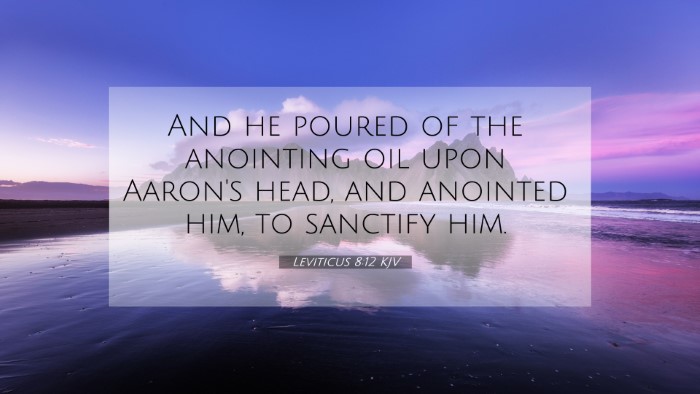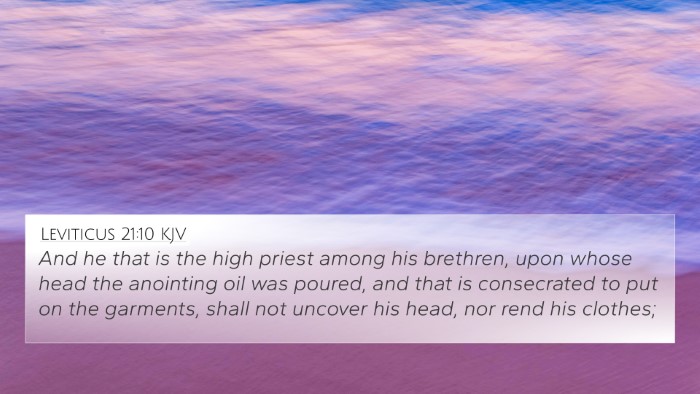Understanding Leviticus 8:12
Leviticus 8:12 states: "And he poured of the anointing oil upon Aaron’s head, and anointed him, to sanctify him." This verse describes a significant event in the ordination of Aaron as the high priest, emphasizing the act of anointing with oil as a means of consecrating him for his sacred duties.
Interpretation and Meaning
The act of anointing in Scripture is deeply symbolic and serves multiple functions within the context of Leviticus 8:12:
- Consecration: The anointing oil signifies God's choice and empowerment. This act sets Aaron apart for the holy office of high priest, affirming that he is called and empowered for specific duties in service to God. As Matthew Henry notes, this emphasizes the importance of divine selection in positions of spiritual leadership.
- Symbol of the Holy Spirit: The anointing oil symbolizes the Holy Spirit's presence and work. It relates to the idea of being filled with the Spirit to fulfill God's tasks effectively. Albert Barnes comments that this anointing indicates divine favor and authority bestowed upon Aaron.
- Covenant Representation: Aaron not only represents himself but the entire nation of Israel, as documented by Adam Clarke. This act symbolizes the collective responsibility of the priesthood to lead the people before God and to mediate on their behalf.
Cross-References
Leviticus 8:12 has several cross-references that illuminate its rich theological themes:
- Exodus 29:7: The ordination ceremony for Aaron and his sons, which provides a more detailed account of the anointing process.
- 1 Samuel 16:13: Samuel anoints David, illustrating the continuity of anointing practices in solidifying God's chosen leaders.
- Psalms 133:2: A metaphorical reflection on the significance of anointing and unity within God’s people.
- Hebrews 5:4-6: The New Testament reflection on priesthood, focusing on Christ as the ultimate High Priest, serving as a fulfillment of the Old Testament priestly role.
- John 20:22: The Holy Spirit's empowerment of the apostles, linking the act of anointing to the empowerment of believers.
- Acts 10:38: Describing Jesus' anointing with the Holy Spirit, establishing a pattern for the anointed leaders of God's people.
- Revelation 1:6: Believers being made priests and kings, with an indication of divine anointing.
Thematic Connections
Through cross-referencing Biblical texts, one can see the interconnectedness of themes surrounding anointing, leadership, and divine empowerment:
- Divine Appointment: The theme of being chosen by God for a specific role is prevalent throughout scripture. This is evident in narratives from the ordination of Aaron to the anointing of David and even to the commissioning of Jesus' disciples.
- Holiness and Consecration: The essential characteristic of sanctification and holiness is woven throughout the biblical narrative. The anointing of Aaron signifies not just physical oil but the impartation of God’s holiness for service.
Tools for Deeper Study
For those engaging in Bible cross-reference study, consider utilizing the following tools:
- Bible concordance: Useful for locating specific keywords and their occurrences throughout scripture.
- Bible cross-reference guide: Provides a systematic approach to tracking related verses and themes.
- Cross-reference Bible study methods: Various techniques for linking Bible scriptures, such as thematic analysis or comparative studies.
- Bible reference resources: Comprehensive studies and commentaries like those from Matthew Henry, Albert Barnes, and Adam Clarke allow for deeper understanding and connections.
Conclusion
Leviticus 8:12 invites readers into a deeper understanding of the significance behind ritual practices, leadership, and the symbolic actions that define our relationship with God. Through the lens of cross-referencing and thematic connections, one can appreciate how the Old Testament establishes principles that resonate throughout the entirety of Scripture. The anointing serves as a profound reminder of God’s calling, impartation of authority, and His ongoing work in the lives of His chosen leaders.








